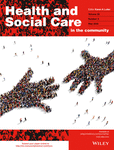Under the radar: General practitioners' experiences of directly employed care workers for older people
Abstract
The Care Act 2014 allows eligible people with care and support needs to access funding directly from local authorities in England. Such funds may be used to employ care workers. Others may employ care workers using their own or family resources. This study explores the working relationships, views and experiences of General Practitioner (GP) about older people's directly employed care workers (DECWs). Qualitative interviews were conducted with 20 GPs in England, identified by convenience sampling of research networks and snowballing methods. Data were analysed thematically. Three overarching themes were identified: (a) anxieties about the identity of the DECW, and their relationship to their employer; (b) experiences of relationship-based care, and; (c) tasks carried out by DECWs. Identity mattered because DECWs can appear as an unknown participant in consultations, raising questions about consent, and prompting thoughts about elder abuse. Uncertainty about identity made documentation of DECWs' details in electronic medical records and care plans problematic. Case examples of relational care illustrated the benefits of reciprocity between older person and their employee who sometimes provided continuity of care and care co-ordination for their employer. Participants were alert to the risks of exploitation and insecurity for DECWs whose tasks were thought to span household and personal care, transport assistance and health-related activities. The involvement of DECWs in maintaining older people's health raises questions about the support they receive from health professionals. In conclusion DECWs are well placed to monitor older people's health, provide continuity of care and undertake certain healthcare tasks. GPs envisaged such workers as potentially valuable assets in community-based care for an ageing population. They called for skills training for this workforce and the development of protocols for delegation of health tasks and safeguarding of vulnerable older people. Older people employing care workers and those advising or supporting them should address communications with health providers in employment contracts and job descriptions.
CONFLICT OF INTEREST
The views presented in this paper are those of the authors alone. The authors have no conflicts of interest.




